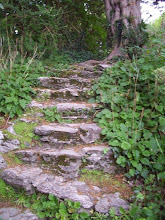★★★★★★★★★★ (7/10)
If I were to describe this book quickly, I would have to say that it's perfectly adorable. Harrison takes a person from Jane Austen's history and creates a whole new view of life in the late 1800s. Many people who enjoy Austen's novels have some idea of what her life was like growing up, but I've rarely seen anyone take someone in Jane Austen's life and breathe a bit of creativity into that person. I Was Jane Austen's Best Friend was a delightful change, regardless of its fictitious nature, and I thoroughly intend to read it again.
This novel follows the diary of Jenny Cooper, a cousin of Jane's who spent a good deal of time with Jane's family. It begins with Jane being very sick, and Jenny deciding to do a deed of great daring, that would get her into an immense amount of trouble were she caught. The two girls are currently in a boarding school, run by a woman more interested in profit that her charges' health, well-being, or education. Jenny decides to send a letter to Jane's mother, which has been forbidden by the school mistress, so she must do this in the dead of night. It is this act of courage (for it would be disastrous to her reputation if she were seen at midnight on the streets without a chaperone), which both earns her the gratitude of the Austen family, and their protection, as well as introduces her to Captain Thomas Williams, who is very important later in the novel.
The Austens go to the school, where they find that Jenny has also taken ill, and bring both girls back to their home in Steventon. For the first time since Jenny's mother died, she is happy and enjoying her life and her schoolwork in the company of the Austen family, and all of the adventures that it entails.
So much for the plot. (I feel that saying much more would ruin the effect of the novel if you decide to read it.)
What I like most about I Was Jane Austen's Best Friend is that Harrison manages to use the details of Austen's life without making the entire novel about Jane. I'm always a bit wary about reading books written about people related to or who were friends of famous personages; there's always a chance that the famous person (i.e. Austen) will become the focus of the book, which defeats the whole purpose. In this novel, Jane happily subsides into the role of supporting character, while Jenny takes the spotlight. I am more interested in Jenny's life than Jane's, although the way Harrison incorporates events in Austen's life does make for interesting reading. I read Jenny's diary entries because I want to know what has happened to her that day, or that week, not because I want to find out what Jane said or did or thought.
Harrison did do one thing that is extremely important: she gave the two girls the bond of authorship -- Jane and her novel bits and Jenny and her detailed diary. While there could be any number of things that could make these two the best of friends, I think Harrison's choice of writing is the most apt. They share many moments in the novel where they just sit in their room writing, then sharing their ideas. It's also kind of funny when Harrison creates events that give Jane or Jenny ideas that are parts of Austen's books (which we know and love).
At the same time though, I was surprised to see how differently the two girls are portrayed. I've always thought of Austen as a woman who never fit into the societal norms, but not exactly to the extent she appears in the novel. She seems to flout propriety at every turn, and there are some instances were I am a bit embarrassed for her. Jenny, on the other hand, is more concerned about growing up to be a well-bred young lady. Given that she has nearly no dowry, no great connections, and a brother and sister-in-law who rather wished Jenny didn't exist, Jenny's life seemingly depends on her making a suitable marriage. Jenny is also a bit more interested in domestic life. She does enjoy the various adventures she gets into with Jane, but she also wants to excel at her "accomplishments" (she draws very well), learn what it takes to run a household, and she thinks more about her future. When I think about these girls side by side, Jenny's image is of a young woman who is a bit shy, but well-mannered and polite, while Jane's image brings to mind a village urchin just waiting to find a mud puddle, but who has the wit and intelligence of a genius. Two drastic images, but when the two are put in the same novel, they balance each other nicely.
All in all, I Was Jane Austen's Best Friend left me feeling quite happy, and I thoroughly enjoyed the brief glimpse into Jenny Cooper's life (that's not her real name though...). Harrison is quite a talented writer, and I hope to find more books from her in the future. There was such a good deal of vivid images and character depth, which I feel is a mark of a great author, as well as a great book, that I would recommend this novel to anyone who enjoys a good romp in history and girlhood.
Wednesday, November 9, 2011
Subscribe to:
Post Comments (Atom)


0 comments:
Post a Comment